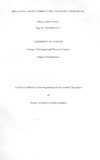| dc.contributor.author | Omanyo, John O | |
| dc.date.accessioned | 2012-11-28T12:26:33Z | |
| dc.date.available | 2012-11-28T12:26:33Z | |
| dc.date.issued | 2012 | |
| dc.identifier.uri | http://erepository.uonbi.ac.ke:8080/xmlui/handle/123456789/6892 | |
| dc.description.abstract | Credit risk being the most common problem facing credit card issuers has attracted a lot of interest in research. Default risk manifestations are more severe in card holders who have missed payments above 60 days and progression to default in the next one year is more rapid than in cardholders who missed payments less than 60 days. Default probability also hastens when average amount past due is more than KES 15000.
The study has also found out that cardholders who utilize there card limits below 50% are less risk to default in the next twelve months.We performed a retrospective cohort study at a large data set obtained from the local bank, and use Logit Model to identify predictors of default and risk factors among cardholders followed for a period of eighteen months, and in particular to determine the impact of financial and nonfinancial on the outcomes among cardholders. Results showed that, 72% of the cardholders who had average amount past due KES 15000defaulted within a period of twelve months. | en_US |
| dc.language.iso | en_US | en_US |
| dc.publisher | University of Nairobi, Kenya | en_US |
| dc.title | Behavioral credit scoring model for credit cardholders | en_US |
| dc.title.alternative | Thesis (MSc) | en_US |
| dc.type | Thesis | en_US |

